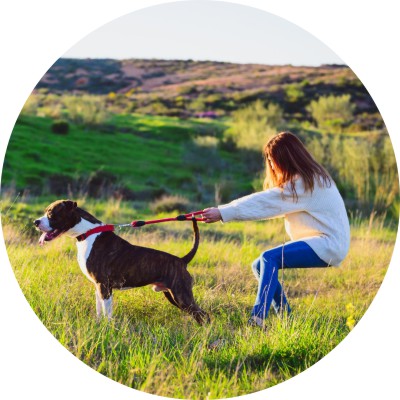 How to Walk a Reactive Dog
How to Walk a Reactive Dog
If you’ve ever walked a reactive dog, you will be familiar with just how anxiety-inducing this can be - both for you and your frazzled pooch.
As you walk along on high alert, eyes constantly scanning for potential triggers, it’s difficult to enjoy what should be a bonding experience.
When confronted with another dog or animal, a stranger or even a vehicle, your dog may:
Because your dog can’t speak to you and calmly verbalise their feelings, this behaviour is their only way of communicating their concerns.
But as a result, you may feel distressed and constantly on edge, fearing an aggressive encounter or an embarrassing battle to get your dog back under control. We’re here to tell you that what you’re feeling is completely normal.
It’s important to note that reactive dogs aren’t necessarily aggressive dogs. However, reactivity can lead to an aggressive outcome, so training is important.
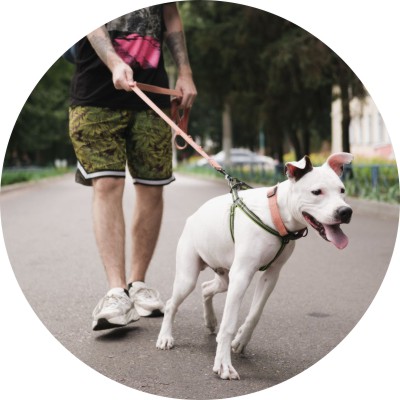 Read on to find out why reactivity occurs and how you can make outdoor adventures a heaps more enjoyable experience.
Read on to find out why reactivity occurs and how you can make outdoor adventures a heaps more enjoyable experience.
Put simply, your dog is fearful and is being pushed beyond the threshold of what they feel they can comfortably tolerate. This leads to hypersensitivity and overstimulation when ‘in the wild’.
Reactivity may happen for a number of reasons, including:
On a more scientific level, studies show that reactivity can occur as a result of arousal related to increased levels of adrenaline and cortisol, especially when faced with uncomfortable or overly excitable situations.
Sometimes it’s impossible to pinpoint exactly why reactivity occurs, particularly with rescue dogs where you don’t know their full history.
As frustrating and stressful as the situation may be, it’s important not to scold or shout at your dog for their reactive behaviour, as this can cause your pup more anxiety and make the situation worse.
However, there’s good news. Help is at hand!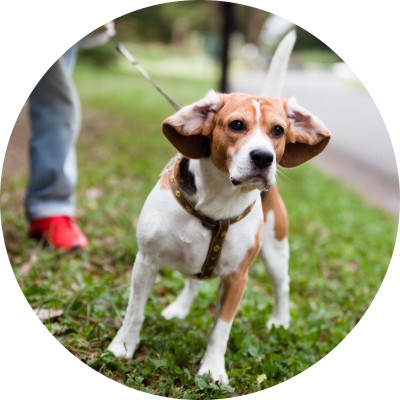
When it comes to training your reactive dog, this is our favourite technique to incorporate into your daily routine.
Triggers are any kind of stimuli that cause an adverse reaction.
For some dogs, this may be a fear of every dog they encounter. Whereas other dogs may only be fearful of certain sizes or breeds. Some dogs will be fearful of all strangers, whereas others may only react to a specific gender.
Context is also important, as different settings can cause varying reactions. For example, some dogs are fine with other dogs when interacting off-leash, but may suddenly react when leashed.
Whenever your pupper encounters a trigger, give them something that they value highly. For most dogs, this will be a favourite food.
Make sure it’s a top-tier treat, not kibble or an everyday snack. It has to be extra special and save it for training only, in order to maximise its value.
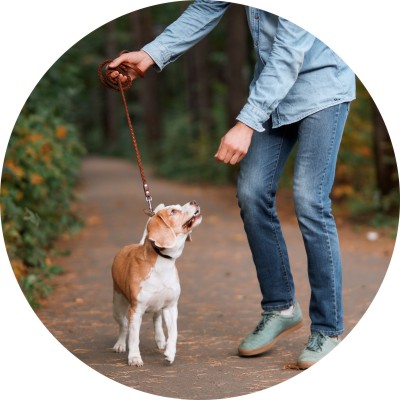 This will gradually retrain your dog’s cognitive processing. For example, whenever a trigger appears, so does a special treat. They will learn to associate something ‘bad’ with something ‘good’. It’s also a great distraction.
This will gradually retrain your dog’s cognitive processing. For example, whenever a trigger appears, so does a special treat. They will learn to associate something ‘bad’ with something ‘good’. It’s also a great distraction.
To begin with, try this technique in a low-stress environment; such as practicing with a friend’s calm pup (from a distance) in a familiar setting. When the other dog leaves, so do the treats.
Repeat this as often as you can and take it slowly. Build up from long distances to closer encounters. It may take time, but it will be worth it in the long run.
Always monitor your dog’s stress levels, keep them on a leash and never push them further than they can tolerate. If they are still showing signs of reactivity (tensing, hackles rising, whites of their eyes flashing, lips curling) when the treats appear, try producing the treats earlier than when the trigger appears or in a different environment entirely.
When it comes to training your reactive pup, we have everything you need!
Our 4Pooch harness is perfect for pooches that pull or lunge, as well as dogs that don’t like a harness being placed over their head. Not only is it comfortable and secure, it features:
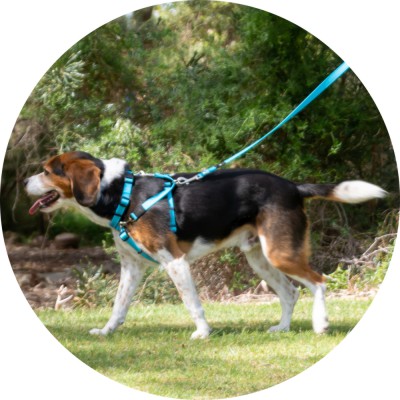 Reflective stitching for visibility in all weather conditions
Reflective stitching for visibility in all weather conditionsWhen paired with the 4Pooch multi-function lead, it provides ultimate customisation and control.
We also stock a range of delicious training treats that your pup will love and can help to build positive associations with potential triggers. Love’em treats are Australian made with quality ingredients that are sure to delight your doggo’s taste buds. They come in a variety of flavours - including chicken, beef and kangaroo - so there’s something to suit every pup’s palate.
Meanwhile, you might find your new favourite training accessory in our ‘travel and training’ section. Training highlights include a wide range of treat bags and pouches for complete hands-free convenience and travel bowls to help keep your canine companion hydrated.
Happy training. You’ve got this!